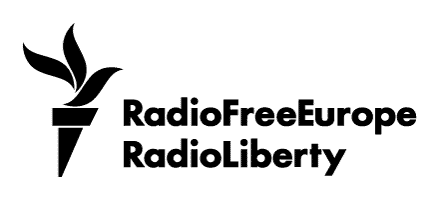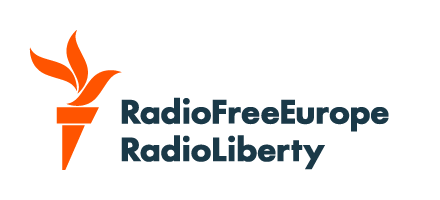Posters have been going up on lampposts, bus stops, and apartment building entrances around the southern Ukrainian city of Kherson, seized and occupied by Russian forces in the early days after Moscow’s February 24 invasion.
“Russians! We Will Turn You Into…” one poster that appeared in June said, over a picture of ground hamburger meat.
Another, glued to walls in Kherson, read: “Do You Want To Live? Give Yourself Up!” and included a QR code that, when scanned on a phone, redirects to a Ukrainian government website that has specific instructions about how to approach a Ukrainian soldier to surrender.
“We have prepared instructions for those who do not want to fight with their homeland,” it says.
While fighting has intensified in both the Kherson region and the neighboring Zaporizhzhya region, a low-level guerrilla war of sabotage, assassinations, and propaganda and disinformation campaigns has been going on for weeks, apparently aimed at undermining Russian control.
Russian authorities have fought back, detaining people in what Human Rights Watch said was a campaign “to obtain information and to instill fear so that people will accept the occupation, as Russia seeks to assert sovereignty over occupied territory in violation of international law...”
Ukraine’s main security agency, the SBU, has made no public claims of responsibility, though observers widely believe it, its military counterpart, or other government agencies are behind the effort to rattle the Russia-installed authorities.
Representatives of Ukraine’s Defense Ministry and military intelligence, however, have acknowledged guerrilla groups were operating in occupied territories.
Poisonings, Shootings
Since occupying Kherson city and much of the Kherson region after the invasion, Russia has set up local administrations to keep the region’s basic governmental functions in operation.
Ukraine has labeled many of these officials collaborators or traitors and signaled they would be punished.
One of those officials was Volodymyr Saldo, a former Kherson city councilor and member of parliament who was installed as the governor of the entire Kherson region by the Russian occupation. Saldo was a member of the now defunct Ukrainian Party of Regions, which had strong pro-Russian sympathies until it was dissolved in 2014.
On August 5, he was hospitalized in critical condition at a Moscow clinic. Russian news reports said the initial diagnosis was that he had been poisoned, but tests were still being conducted.
On August 9, he was reportedly removed from a ventilator and was conscious.
According to Sergei Khlan, a local lawmaker, it was the second time since June that Saldo fell suddenly ill under unexplained circumstances.
The same day that Saldo fell ill, the deputy head of the town of Nova Kakhovka, a town northeast of Kherson, was shot and killed outside his home.
No one has claimed responsibility.
Car Bombs And Land Mines
Russia-installed officials have been the targets of other attacks as well.
On June 24, a bomb exploded in a car carrying Dmytro Savluchenko, who led a local government office in charge of youth and sports for the occupied Kherson region.
Savluchenko, who was described by Ukrainian media as “one of the best-known local collaborators,” was reportedly killed in the bombing. Two other cars were damaged in the blast, which shattered windows in nearby apartment blocks.
Two days earlier, a car carrying the head of a suburban district outside Kherson hit a land mine, raking the car with shrapnel. The man, Yuriy Turulov, escaped with minor injuries, according to Russian state media.
Earlier in the month, Turulov had been warned in an SBU video that he was regarded as a “collaborator.”
In late May, the Russia-installed mayor of Enerhodar, a town northeast of Kherson along the Dnieper River in the Zaporizhzhya region, was seriously wounded in an explosion.
Аlso in May, an explosion in Melitopol, a city in the southern part of Zaporizhzhya, injured two people. The blast, which was blamed on partisans, targeted the Russian-backed proxy leader of the region, Yevhen Balytskyi.
“This morning there was a terrorist attack aimed at destabilizing the peaceful life of the city,” city authorities said in a statement on Telegram.
“The resistance movement is pursuing three goals -- to destroy Russian weapons and the means of supplying them, discrediting and intimidating the occupiers and their collaborators, and informing Ukrainian special services about enemy positions,” Ivan Fedorov, the Ukrainian-recognized mayor of Melitopol, told the Associated Press.
Posters, Placards, Graffiti, Newspapers
Mysterious leaflets and posters began appearing in Kherson shortly after Russian forces seized the city, which was the first major Ukrainian urban center occupied by Russia in late February.
Some are explicitly threatening, targeting Russian authorities and Ukrainian civilians working alongside them. Others, such as those attributed to a group called the Yellow Ribbon movement, have broader goals.
The posters, which began appearing sometime around July 15, seek to disrupt a so-called referendum that Russian authorities are planning for the region in the coming months. The polls – in both the Kherson and Zaporizhzhya regions -- are expected to pave the way for a bid by Moscow to annex the regions, following a scenario similar to what happened in Crimea in 2014. As in Crimea, the outcome is expected to be a contrived win for the Kremlin.
The posters include detailed instructions for sympathetic Ukrainians. For example, one post warns people not to accept or apply for Russian passports, which are being distributed to Kherson residents. The post cites Ukrainian criminal law and asserts that obtaining a Russian passport is punishable treason.
Another calls on people to paint an “R” on buildings where authorities are making preparations for the so-called referendum.
Other posters appear to taunt Russian soldiers and their civilian sympathizers, asserting that Ukrainian forces were inching closer to Kherson city: “Are You Ready To Sing The Ukrainian Anthem? Kherson Is 10 Kilometers From Freedom.”
Yet another provided instructions on how to make Molotov cocktails.
On August 6, the Yellow Ribbon organization -- Zhovta Strichka in Ukrainian -- announced that it had launched an underground newspaper called Voice Of The Partisan to be distributed locally.






